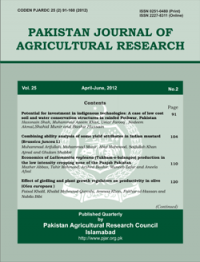COMPETITIVENESS OF TOMATO PRODUCTION IN PUNJAB, PAKISTAN
Waqar Akhtar*, Muhammad Sharif**, Abdul Hayee Qureshi*, Khalid Mahmood Aujla*** and Muhammad Azeem Khan*
ABSTRACT
The study measures competitiveness at farm level and economic efficiency at country level of tomato production in relation to tomato trade by using Policy Analysis Matrix (PAM) framework in Punjab, Pakistan. The province was divided into two tomato production regions i.e., Central and Southern Punjab for analysis purpose under importable scenario by using import parity price. Results of PAM model revealed that tomato production in both regions of Punjab has competitiveness under prevailing market situation as indicated by positive private profitability and private cost ratio (PCR) which is less than 1. Competitiveness difference in two regions indicated that Central Punjab has more competitiveness at farm level in tomato production. Economic efficiency results i.e. Domestic Resource Cost (DRC) ratio remained 0.39 and 0.51 in Central and Southern Punjab, respectively with positive social profitability indicating strong comparative advantage under importable scenario. The above results implied that Central Punjab has greater economic efficiency than Southern Punjab in domestic resources use for production of tomato as import substitute commodity. Results of Nominal Protection Coefficient (NPC) and Effective Protection Coefficient (EPC) indicated that combine effects of policies on output and tradable input market did not pass any protection to tomato farmers in the study area. Net effect of policy or market failure is reducing the profitability of tomato producers at farm level which indicates lack of motivation from policies for farmers to expand tomato production as import substitute crop. Present study recommended competitiveness and economic efficiency analysis in other tomato producing regions of the country for year round tomato supply on the basis of resource efficiency and to curtail tomato imports to save the precious foreign exchange. To enhance the competitiveness there is need to increase farmer's incentives through increase of farm level price up to import parity prices of tomato through efficient marketing. Technological improvement in production, marketing and value addition of tomato is also needed to address farm and market level issues of competitiveness.
To share on other social networks, click on any share button. What are these?






